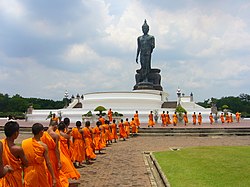Bhikshu
| Bhikkhu | |||||||||

Buddhist monks in Thailand
|
|||||||||
| Chinese name | |||||||||
|---|---|---|---|---|---|---|---|---|---|
| Chinese | 比丘 | ||||||||
|
|||||||||
| Native Chinese name | |||||||||
| Chinese | 和尚 | ||||||||
|
|||||||||
| Burmese name | |||||||||
| Burmese | ဘိက္ခု | ||||||||
| Tibetan name | |||||||||
| Tibetan | དགེ་སློང་ | ||||||||
|
|||||||||
| Thai name | |||||||||
| Thai | ภิกษุ | ||||||||
| RTGS | phiksu | ||||||||
| Japanese name | |||||||||
| Kanji | 僧、比丘 | ||||||||
|
|||||||||
| Tamil name | |||||||||
| Tamil | துறவி tuṟavi | ||||||||
| Sanskrit name | |||||||||
| Sanskrit | भिक्षु | ||||||||
| Pāli name | |||||||||
| Pāli | Bhikkhu | ||||||||
| Nepali name | |||||||||
| Nepali | भिक्षु | ||||||||
| Transcriptions | |
|---|---|
| Standard Mandarin | |
| Hanyu Pinyin | bǐqiū |
| Wade–Giles | Pi3-ch'iu1 |
| Transcriptions | |
|---|---|
| Standard Mandarin | |
| Hanyu Pinyin | héshàng |
| Wade–Giles | he2-shang4 |
| Transcriptions | |
|---|---|
| Wylie | dge slong |
| THDL | gelong |
| Transcriptions | |
|---|---|
| Romanization | Sō, biku |
A bhikkhu (Pali, Sanskrit: bhikṣu, Sinhala: භික්ෂුව) is an ordained male monastic ("monk") in Buddhism. Male and female monastics ("nun", bhikkhuni (Sanskrit bhikṣuṇī) are members of the Buddhist community.
The lives of all Buddhist monastics are governed by a set of rules called the prātimokṣa or pātimokkha. Their lifestyles are shaped to support their spiritual practice: to live a simple and meditative life and attain nirvana.
A person under the age of 20 cannot be ordained as a bhikkhu or bhikkhuni but can be ordained as a śrāmaṇera or śrāmaṇērī.
Bhikkhu literally means "beggar" or "one who lives by alms". The historical Buddha, Prince Siddhartha, having abandoned a life of pleasure and status, lived as an alms mendicant as part of his śramaṇa lifestyle. Those of his more serious students who abandoned their lives as householders and came to study full-time under his supervision also adopted this lifestyle. These full-time student members of the sangha became the community of ordained monastics who wandered from town to city throughout the year, living off alms and stopping in one place only for the Vassa, the rainy months of the monsoon season.
In the Dhammapada commentary of Buddhaghosa, a bhikkhu is defined as "the person who sees danger (in samsara or cycle of rebirth)" (Pāli: Bhayaṃ ikkhatīti: bhikkhu). He therefore seeks ordination to obtain release from it. The Dhammapada states:
...
Wikipedia
